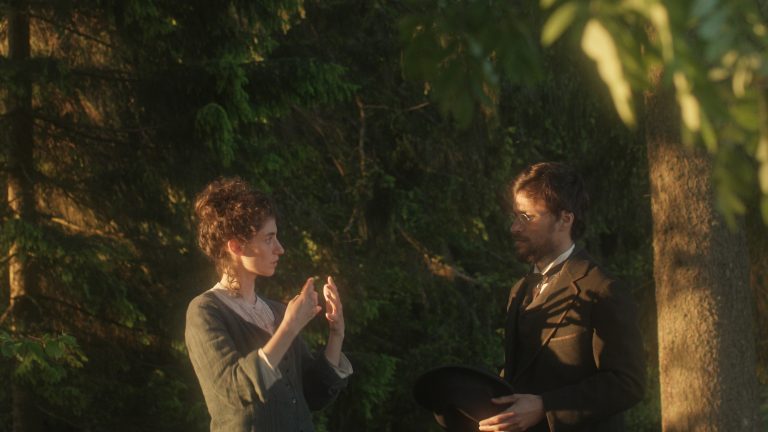Some of my favorite films are about two people talking to each other. From the likes of “Before Sunrise” to lesser-known indie features like “Spring“, I have always enjoyed watching two people who can justify their outlook of the world through their personal viewing lens. Mari Walker’s “See You Then” is essentially a drawn-out conversation between two ex-lovers. Seemingly hinged on its nostalgia factor and the secrets that are best kept overdrawn, the film takes its own time to get to the point. While it completely dislodges and fails to maintain the abrupt shift in tone in the third act, the journey up until then cannot be ignored.
The film starts with Kris (Pooya Mohseni) on a call with her nieces. It’s quite evident from the call that she adores kids. Director Mari Walker makes sure she drops hints all through the narrative for her shocking revelation towards the end feel earned. The narrative, on the other hand, follows a night of long conversations between Kris and her ex-lover Naomi (Lynn Chen). The two of them hang out with each other and walk past familiar lanes to dwell on what worked and did not worked between them.
Related to See You Then – [Watch] The Garden Left Behind Trailer: Moving Drama about an Undocumented Mexican Trans Woman in New York City
The ex-couple haven’t been in touch for over a decade. An abrupt breakup between the two during their college has basically shaped their lives up until the present day. While Kris has now transitioned into a woman who has been trying all these years to come to terms with her sexuality, Naomi has left her performance art in the lure of taking care of her family that now constitutes two young girls.
In a way, this is a trans narrative. But director Mari Walker also makes sure that it doesn’t just clog itself into a corner for just being that. It is more of a crisis of identity. Both Kris and Naomi have gone through a 360 transformation in their lives. While Kris’ transformation has been both physical and mental, Naomi has left a part of herself buried deep within the confines of the past to take up an entirely different persona.

The director is eager to understand that. Hence, she peppers her film with moments of slight tension. It’s evident when the two first meet that their history surpasses what initially catches the eye. The film – which consists of conversations and is mostly a two-handler, places these two characters in a kind of flux. While Kris is more involved in letting go of the past to forge a newer path, Naomi is more inclined towards getting the conflict between them to come up to resolve.
We all know that whatever secrete abounds them within their shared journey years ago, will be a heartbreaker. However, when Mari actually gets to that point, the abrupt revelation doesn’t feel like one that organically feeds into the narration. All through the film Kris and Naomi mostly talk about how it’s like to be a woman in the real world, whilst their conflict is more on a personal level.
The Mari Walker makes sure that both the trans and Asian-American character at the center of the film doesn’t feel like caricatures. She bestows them with empathy and a real sense of understanding, but somewhere down the road their conversations, though organic, feel superficial. It doesn’t help that Pooya Mohseni is not really up for the task as an actor. Her expressions feel stilted and much of the heavy lifting is done by the absolutely brilliant Lynn Chen.
Also, Read – True Mothers (2020) Review: Naomi Kawase’s Potent Yet Frustrating Ode To Motherhood
The talky nature of the film is both a boon and curse here. While it helps us get in the headspace of the characters, it leaves certain progression to feel like they could have used a more narrative-driven approach. This brings us to the pre-climax and climax of the film which comes down to a metaphorical performance piece. The way it’s been directed makes Chen’s characters feel like a complete reverse of what we have known about her up until now. While I understand that Walker’s point is to really question the meaning of what a ‘woman’ really stands for, it comes off as oblique.
“See You Then” also lifts its entire plot from a much better Alexandre Lehmann film ‘Blue Jay.’ In a way, the film offers a trans and Asian-American angle to the same story. Essentially bringing almost all of its well-earned conversations to an underwhelming end.



![The Silence [1971] – An Insightful Study of Inner Spiritual Conflicts](https://79468c92.delivery.rocketcdn.me/wp-content/uploads/2016/12/The-Silence-cover.jpg)

![Local Hero [1983] Review – An Immensely Enjoyable Scottish Dramedy](https://79468c92.delivery.rocketcdn.me/wp-content/uploads/2018/10/Local-Hero-1983-768x432.jpg)
![The BFG [2016]: Spielberg’s Territory but not Spielberg Enough](https://79468c92.delivery.rocketcdn.me/wp-content/uploads/2016/07/The-BFG-4-featured.jpg)

